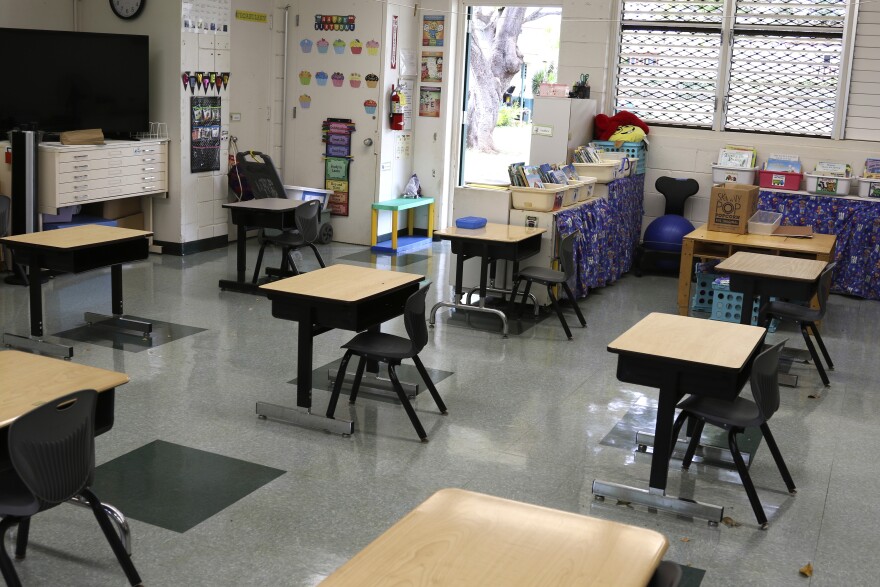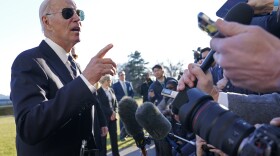Frightening calls from the school nurse. Waiting in vain for word from school officials. Canceled sports practices. Marching bands in quarantine.
For countless families across the country, the school year is opening in disarray and confusion, with coronavirus outbreaks triggering sudden closings, mass quarantines and deep anxiety among parents.
Schools in at least 10 states have had students and staff test positive for the virus since they began opening. The outbreaks have occurred in a variety of school settings: marching bands, high school football teams, elementary classrooms, high schools.
A Colorado high school shut down for two weeks after two students tested positive. Football teams in Utah canceled practices and games after several players came down with the virus. The entire football team and marching band in a small Alabama town were placed under quarantine because of exposure to the virus, the second time the team had to be quarantined this summer.
Michigan is reporting 14 outbreaks at schools. Mississippi started the week with about 2,000 students and 600 teachers in quarantine; the state has had 245 cases of coronavirus in teachers and about 200 in students since districts began returning to school in late July.
Joel Barnes got the call from the school nurse on Aug. 6: His 14-year-old son had been exposed to COVID-19 by a classmate at their high school in Corinth, Mississippi, and needed to be picked up right away.
By that time, Barnes and his wife had heard through the grapevine — mainly Facebook — that at least six people at the school had tested positive and more than 100 students were being told to quarantine. The district posted the information on Facebook, but never followed up with personal communication, Barnes said.
He and his wife decided to keep their son, a freshman, home to learn online even though he tested negative for the coronavirus. "It's not as difficult as worrying about him being exposed to COVID again," Barnes said.
He says he's grateful the district released some limited information, but he's frustrated there wasn't more — and that the state attorney general said schools were not required to inform parents of outbreaks.
"I do understand that there are state and federal laws governing what you can say about students," said Barnes, a retired teacher, "but you're not giving out names, you're just giving out numbers."
"This is a national public health crisis," he said. On top of that, he added, "I have significant health issues, and it would not be good for me to be around someone who has it or to get it myself."
The K-12 clusters have mirrored the situation at colleges and universities that have had to shut down in-person learning and switch to virtual classes, albeit for different reasons. Many of the college outbreaks have been traced back to fraternity and sorority gatherings, crowded bars and a lack of masks and social distancing. Students around the country have been suspended for violating bans on campus parties and gatherings.
High school students have been flouting mask and social distancing rules as well. At a high school football stadium Thursday in Utah, the athletic director stopped the game, grabbed the public-address microphone and told the crowd that play would not continue until fans complied with mask and social-distancing requirements.
The developments offer a glimpse into the future for schools around the country still deciding whether to return students to the classroom and weighing the risk of broader community infection if they reopen.
U.S. health officials on Friday released a study they said showed that the right measures can keep spread of the virus low in child-care centers.
The study looked for evidence of spread of the virus at 666 child-care programs in Rhode Island that were open last month. The state required centers to reduce the number of people in programs to no more than 20, including staff. It also required adults to wear masks at all times, daily symptom screening of children and adults, and enhanced cleaning and disinfection guidelines. The CDC does not currently recommend that universal symptom screenings be conducted by schools.
Nearly 19,000 kids attended. Investigators identified only 52 confirmed and probable cases, including 30 children and 22 adults. The children ranged from less than one year old to 12, with a median age of 5.
The CDC study does seem to show that day care centers and even schools can be reopened in some places, said Dr. Mike Saag, an infectious disease expert at the University of Alabama at Birmingham.
But, he quickly added, that's only in places where spread of the virus is low, and where schools and day care centers are able to do a lot of work to stay on top of new infections.
In Omaha, Nebraska, Jared Wagenknecht said he was tucking his daughter into bed earlier this month when she looked him in the eyes and said, "Daddy, I hope the coronavirus goes away before August 11." That was the day she would start first grade.
Instead, Wagenknecht's daughter and others in the K-12 district of more than 50,000 students are being taught remotely, after a plan for alternate in-person school days was scrapped.
Thirty-five confirmed cases of COVID-19 have been reported in Omaha-area schools in the early weeks of the school year. Many suburban Omaha districts, including the high school where Wagenknecht teaches social studies, have opted for 100% classroom teaching. So while he goes to school every day, his daughter learns from home.
"As a parent and educator, yes, we want students back to school," Wagenknecht said. But he added: "The only way we're going to be able to be in school very long and stay back is to get the infection rate down."
In Tennessee, many parents have watched in dismay as Gov. Bill Lee's administration waffled for weeks on how much information the state would provide on outbreaks in schools. Tennessee was one of the earliest states to begin reopening schools, while also experiencing one of the fastest per-capita spreads in the country.
The Republican's health secretary had initially declared such information would not be released, only for Lee to later reverse course.
But after two weeks of no new information, Lee flipped again when his top education and health officials announced the state was barred by federal privacy laws from releasing such data. The governor changed course again Thursday when he said his administration would ask the federal government for permission to release it.
Parents and education officials have been outraged over the lack of transparency.
John Little, a father of a sixth grader who has been doing virtual schooling since Aug. 4, said he was "dumbfounded" when he heard Lee say privacy laws prevented the release of more detailed data. He and other families are looking to the governor to help them make informed decisions.
"I just think releasing this information is the right thing to do," Little said.




